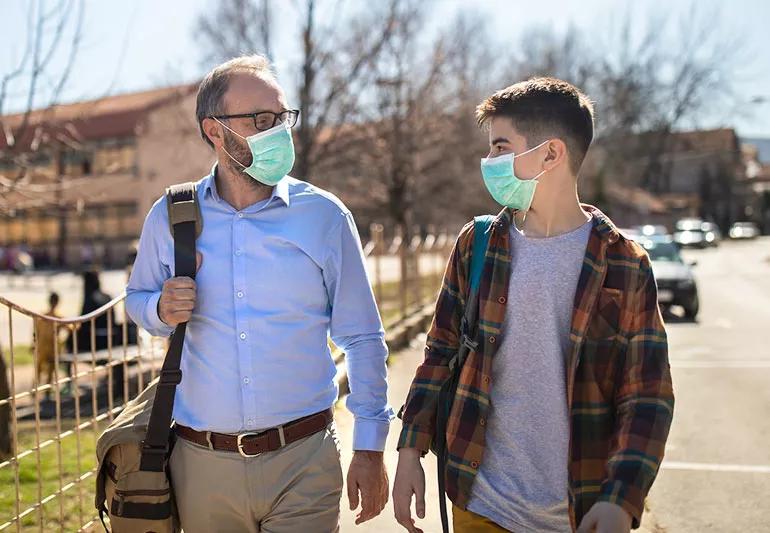How to help your teen navigate current social challenges

Image content: This image is available to view online.
View image online (https://assets.clevelandclinic.org/transform/0539e961-5f15-4fb7-a8f3-b1b104d72e0c/talkCovidTeen-1213676360-770x533-1_jpg)
Parent talking with son about Covid-19 concerns.
Many teens and pre-teens emerged from mandatory lockdowns to slow the spread of COVID-19 starved for the company of their friends.
Advertisement
Cleveland Clinic is a non-profit academic medical center. Advertising on our site helps support our mission. We do not endorse non-Cleveland Clinic products or services. Policy
Despite new rules of engagement that include wearing face coverings and avoiding large gatherings, some young people packed sidewalks, restaurants, beaches and parks. There were hugs and close huddles — sometimes with no masks in sight.
Now, the rate of positive COVID-19 tests in this age group are climbing. Adults have been left wondering whether young people failed to understand the danger or chose to ignore the warnings.
In some ways, this was actually predictable behavior, says Ellen Rome, MD, MPH, Head of the Center for Adolescent Medicine.
“A sense of invulnerability — showing up here as an act of defiance — is part of the adolescent mindset,” she says. “This reaction is developmentally typical.”
Most adults understand that COVID-19 could possibly make them sick enough to die, and that they need to protect themselves from exposure to the coronavirus. They also understand that even people who don’t have symptoms could be infected and spread the virus to others.
But adolescents don’t always think so logically. Abstract thought — which includes the ability to understand consequences — doesn’t tend to develop until the later teen years.
Although adolescents look to their peers for support, direction should come from parents or caregivers.
Advertisement
“Authoritative parents are lighthouses that provide a safe harbor and a way to reach it,” Dr. Rome says. “They guide, encourage and step in when there are issues involving mortality, ethics or safety, which certainly describes COVID-19.”
If you’re a parent of an adolescent, you can help them navigate current challenges by figuring out where they are coming from and playing to their strengths.
Here are some ideas for how to talk to them about following COVID-19 precautions.
As a final note, Dr. Rome advises being supportive and inclusive. “Ask your adolescent about their fears, respond with empathy and invite them to create innovative solutions,” she says. “You may be surprised at how well they respond.”
Advertisement

Delivered every Tuesday!
Sign up for our Health Essentials emails for expert guidance on nutrition, fitness, sleep, skin care and more
It's a letter about the news!

Every two weeks once
Sign up for our Health Essentials emails for expert guidance on nutrition, fitness, sleep, skin care and more.
Learn more about our editorial process.
Advertisement
The short answer: It’s complicated, but the basic care precautions still prevail, like washing your hands and isolating if you’re sick
They can feel like a typical headache or a migraine headache, but the pain can last for weeks to months
Any large social gathering — from a family birthday party to an indoor music concert — has the potential to spread serious infection
It’s important to connect with a healthcare provider, get quality sleep and balance your activities with your energy levels
Just like the flu, COVID-19 will continue to evolve every year
The duration varies, but symptoms can linger for a few days up to a couple weeks or more
Vaccination is best for prevention, but if you get sick with COVID-19, treatments are available
The virus lives best in humans, but it can last on hard surfaces, like doorknobs and railings
Type 2 diabetes isn’t inevitable with these dietary changes
Applying a hot or cold compress can help with pain
Pump up your iron intake with foods like tuna, tofu and turkey